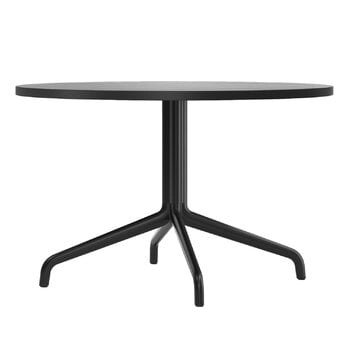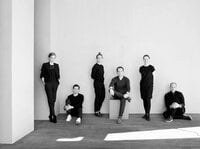Audo Copenhagen’s Harbour Column coffee table complements the timeless Harbour collection designed by design duo Norm Architects, Kasper Rønn and Jonas Bjerre-Poulsen. Combining geometric and organic design languages the Harbour Column coffee table is a delightful addition to the lounge area at home, or to a cafe. The minimalist yet expressive form of the table simultaneously blends in effortlessly and introduces a hefty dose of modern elegance to the space.
Harbour Column lounge table, 80 cm, black base - black stained o
Audo Copenhagen
Description
Audo Copenhagen’s Harbour Column coffee table complements the timeless Harbour collection designed by design duo Norm Architects, Kasper Rønn and Jonas Bjerre-Poulsen. Combining geometric and organic design languages the Harbour Column coffee table is a delightful addition to the lounge area at home, or to a cafe. The minimalist yet expressive form of the table simultaneously blends in effortlessly and introduces a hefty dose of modern elegance to the space.
Product details (6)
- Colour
- Black
- Height
- 50 cm
- Diameter
- 80 cm
- Table top material
- Stained oak veneer
- Base material
- Powder coated steel and aluminium
- Weight
- 20 kg
- Product ID
Designer
Norm Architects is a dynamic design duo composed by the Danish architects Kasper Rønn (b. 1976) and Jonas Bjerre-Poulsen (b. 1976), both graduates of the Royal Danish Academy of fine Arts in Copenhagen. Being true modernists, they believe in design where the focus is in meeting a real need instead of creating one, and this reflects from their work as architects as well as industrial designers.
Read moreReviews (0)
Sustainability
The Product Sustainability Framework, our criteria of sustainable design, helps you find the most sustainable products in our selection. Read below which sustainability criteria this product has met.
Working conditions & labour 7/9
-
Equal opportunities for all employees
-
Commitment to UN Global Compact, fair compensation for all employees
-
Corporate responsibility requirements defined and communicated for suppliers
-
Systematic work for improved inclusion and well-being in the workplace
-
Transparent supply chain
-
Suppliers' compliance to a code of conduct ensured
-
Compliance to the UN Guiding Principles on Business and Human Rights ensured in the supply chain
Eco-friendly production 8/9
-
Fair and resource-wise water-use in production
-
No incineration or landfilling of returned items
-
No use of endangered species as materials
-
No direct environmental emissions or waste (excl. GHGs) from production
-
The sustainability of direct suppliers' production is addressed and monitored
-
Production and material sourcing that respect biodiversity, animal rights, and natural ecosystems
-
Material-efficient and ecological packaging
-
No potentially harmful chemicals used in own production
Climate impact 4/8
-
Company's direct greenhouse gas emissions identified and commitment to reduction
-
Product's carbon impact identified and commitment to reduction
-
Guidance on energy- and eco-efficient use of the product
-
Carbon footprint of the product calculated and goals set to reduce it
Sustainable materials 6/6
-
Sustainable and long-lasting material choices
-
No harmful or hazardous substances
-
Responsible raw material sourcing and production
-
Materials suited for circularity: monomaterials, recyclable finishings, renewable or recycled contents etc.
-
Ecological materials: natural, biodegradable, recyclable or recycled contents
-
Outstanding materials in terms of innovativeness, responsibility, sustainability and circularity: local production or sourcing, 100 % recycled content, C2C-certification etc.
Circular design 4/5
-
High aesthetic quality promoting long-term use of the product
-
Technically durable product design and material choices
-
Design for enduring life-long quality
-
Design and support for product maintenance, repair and upgradability




